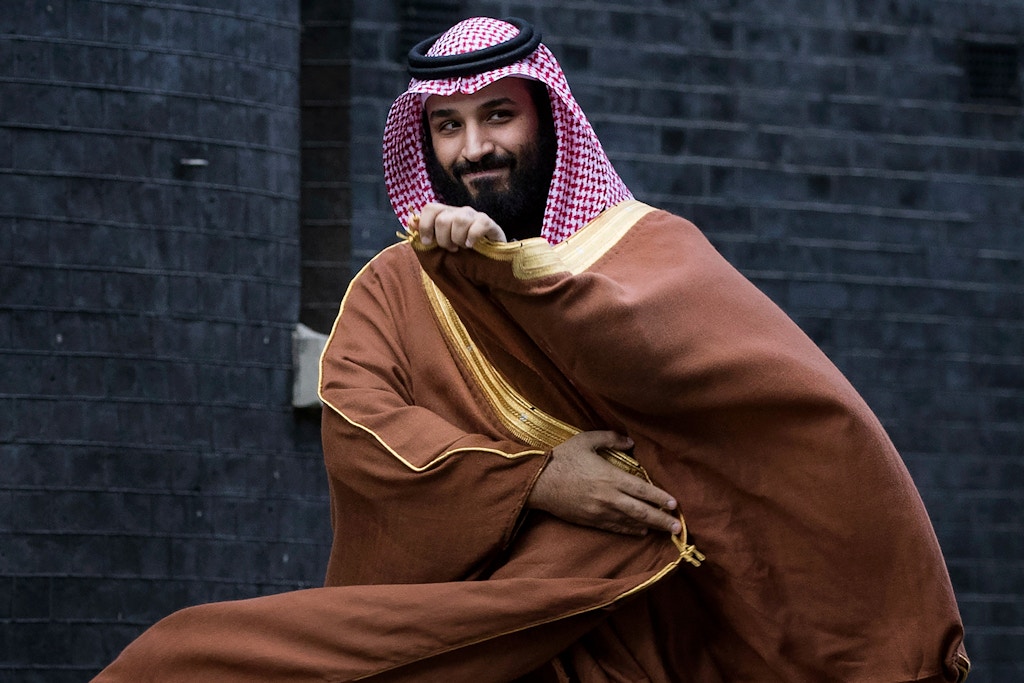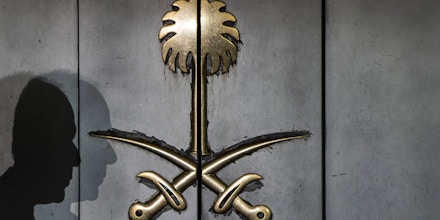You tell me.
From The Intercept:
Mohammed bin Salman Is Running Saudi Arabia Like a Man Who Got Away With Murder

Saudi Crown Prince Mohammed bin Salman arrives to meet with British Prime Minister Theresa May in London, England, on March 7, 2018.
Photo: Dan Kitwood /Getty Images
LAST WEEK, SAUDI Arabia’s General Entertainment Authority announced 2019 as the “Year of Entertainment” in the kingdom. With a $64 billion budget granted by Crown Prince Mohammed bin Salman, the plan comes complete with a social media platform and an app — Enjoy_Saudi — and aims to “transform the Kingdom into one of the top ten international entertainment destinations.” The authority said it is negotiating contracts to bring international stars, such as Mariah Carey, Jay-Z, Trevor Noah, Chris Rock, and Seth Rogen, among others, to the kingdom.
The same week, Amnesty International published new reports of systematic torture and sexual abuse of numerous female activists currently being held in Saudi prisons. Most of the women are now in their ninth month of detention, where they’ve been held without charges or legal representation. Evidence linked the women’s mistreatment to Saud al-Qahtani, a former top adviser to bin Salman who has been implicated in the murder of Washington Post journalist Jamal Khashoggi. “Not only have they been depriving them of their liberty for months now, simply for peacefully expressing their views, they are also subjecting them to horrendous physical suffering,” said Lynn Maalouf, Amnesty’s Middle East research director. The Saudi Ministry of Media has rejected the claims of torture as “baseless,” and has denied human rights observers any access to the prisoners.
“Not only have they been depriving them of their liberty for months now, simply for peacefully expressing their views, they are also subjecting them to horrendous physical suffering.”
It should come as no surprise that the Saudi regime has little to say on the matter. Such dismissiveness is to be expected from a monarch who, far from being deposed by the Khashoggi scandal, now has the confidence of a man who has gotten away with murder. Unleashed and unrepentant, bin Salman’s campaign against dissent continues unabated — and, as the Amnesty report shows, has targeted the women he promised to liberate in unprecedented ways.
The coinciding reports from the General Entertainment Authority and Amnesty represent more than dark irony: They are also a re-enactment of one of bin Salman’s earliest tactics. Such aggressively enthusiastic, Western-centric campaigns were a prominent feature of the early years of bin Salman’s reign, when the ascendant prince wowed the world by re-introducing movie theatersand live concerts to the kingdom. At the time, many Saudis and non-Saudis alike were so struck with the spectacle of Saudi’s sudden embrace of Hollywood films and Cirque du Soleils that the crown prince’s emerging authoritarianism went largely unnoticed. Busy remarking on superficial social reforms, Western media neglected — or declined — to press bin Salman on his crackdowns on free speech, his censorship of the local press, the ongoing carnage in Yemen, or his failure to address the country’s legalized gender discrimination.
 Read Our Complete CoverageMaking a Killing
Read Our Complete CoverageMaking a Killing
This reckless silence extended even as the crown prince’s abuses grew more brazen. In May, bin Salman, who is often known by his initials, MBS, began his crackdown on peaceful women’s rights advocates. The women included internationally recognized activists, such as Loujain al-Hathloul and Eman al-Nafjan, as well as Samar Badawi, a recipient of the State Department’s International Women of Courage award. Renowned academics, such as Hatoon al-Fassi, were also rolled up in the crackdown.
The arrest of these women demonstrated bin Salman’s expanding practice of jailing and intimidating even the most moderate of his critics — or those who he feared might eventually undermine his messaging. Many of the women had voiced their willingness to work alongside the government to accomplish reform, including an end to the country’s notorious male guardianship law. Several of them, after being warned by the Royal Court to abandon their activism, had already fallen virtually silent. Yet the Saudi government followed their arrests with a series of smear campaigns, alleging without evidence that several of the women had been involved in a foreign plot against the government.
EVEN AFTER THE arrests, the world persisted in lauding bin Salman as a pioneer of reform. Meanwhile, he was quietly bringing Saudi’s human rights record to new lows. According to human rights organizations, the women detainees suffered floggings and electric shocks at the hands of their captors. At least one woman was reported as being hung from the ceiling. Another had a water hose forced into her mouth, while two other women were made to kiss one another while leering guards looked on. Other methods of sexual and psychological abuse were also reported.
Such mistreatment is not only an egregious violation of international law, but also a dramatic departure in the context of patriarchal codes of decency in the kingdom.
Such mistreatment is not only an egregious violation of international law, but also a dramatic departure in the context of patriarchal codes of decency in the kingdom. These social conventions can frequently be covers for gender violence and oppression, yet they also generally constrain what is acceptable in the public sector. The tabloidesque defamation of al-Hathloul and others, as well as the blatantly sexual nature of their abuse, transgresses them all.
As one regional human rights observer told me, women political prisoners were rare before bin Salman, and such public smear campaigns and physical violence “would have been unheard of just a few years before.” In keeping with this grim trend, Saudi Arabia announced in August that it would seek the death penalty for Israa al-Ghomgham, an activist from Saudi Arabia’s repressed Shia minority and the first female rights advocate to face capital punishment.
Such shocking new tactics should have been taken as a warning, but the women’s arrests in the summer of 2018 generated little more than a murmur from the foreign press. At the time, too many were still enamored with bin Salman and distracted by the long-awaited end to the ban on women drivers. While some noted the irony that many of the women who had championed the cause of women drivers for years or decades would be behind bars on that historic day, most found the narrative allure of women “taking the wheel” too poetic to resist. On the ground in Riyadh and Jeddah last summer, I watched the international press corps, herded by Saudi handlers, flock from photo-op to photo-op, gleefully reaching cameras and pencils in the direction of smiling women in driving simulators and luxury cars. On the morning when the ban was official lifted, they sent home dispatches published with glowing headlines touting a new day for gender empowerment in Saudi Arabia.
Since then, the global scandal of Khashoggi’s murder forced a much-belated reckoning with the true nature of bin Salman’s rule. For a moment, international outrage seemed to approach proportionality with the regime’s ongoing crimes, perhaps strong enough to diminish bin Salman’s influence for good.
Yet the reckoning was fleeting. As the weeks passed and the kingdom’s key allies and trading partners — most notably the U.S. but also many European nations — failed to meaningfully sanction the crown prince, bin Salman began to maneuver back into the global political landscape. With U.S. President Donald Trump’s early, frequent, and vociferous defenses ringing in his ear — as well as the ongoing trade and diplomatic relations with countries like the U.K. and France — the message bin Salman received was not one of censure, but of tacit absolution.
The crown prince has not only maintained his power, but intends push forward his unilateral “Vision 2030” agenda, complete with self-congratulatory fanfare. Since Khashoggi’s death, bin Salman has continued to court global capital. He held his own “Davos in the Desert” — hosted at the same Riyadh Ritz-Carlton where bin Salman imprisoned hundreds of his own citizens in 2017 — and attended the G-20 summit, where he was warmly greeted by Vladimir Putin and Xi Jinping.
Inside the kingdom, many ordinary Saudi citizens now avoid any type of social or political speech, even on anonymous Twitter accounts, fearing that they’ll somehow trigger one of the kingdom’s expanding, and increasingly enforced, anti-terrorism and “anti-cybercrime” laws. Others, while enjoying the occasional movie or concert, worry more often about rising costs of living and wonder when, if ever, bin Salman’s lofty promises for economic prosperity will trickle down to them. Women, even those who benefit from the ability to drive, still face a myriad of legal and cultural obstacles to equality, most notably the male guardianship laws.
While the Saudi government under bin Salman pursues American entertainers, opens wax museums, and rolls out hashtags, untold numbers of political prisoners remain in detention, inaccessible to international observers, lawyers, and family members alike. As with Khashoggi, the Saudi regime has only deigned to issue scant, unpersuasive denials in the face of mounting evidence of their abuse of the female prisoners and its ongoing violations of international law.
It is hard to imagine what, if not the global scandals of Jamal Khashoggi and Rahaf al-Qanun, will prompt enough meaningful action to censure bin Salman. As bin Salman resumes his efforts to distract and entertain his way back into popular acclaim, it is incumbent on the watching world to refuse, anymore, to blink.
We depend on the support of readers like you to help keep our nonprofit newsroom strong and independent. Join Us





No comments:
Post a Comment